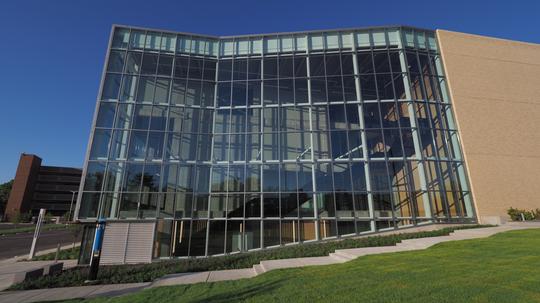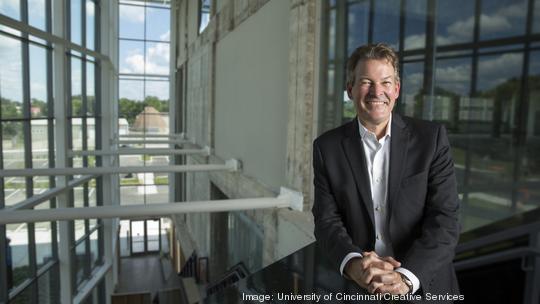
A New York-based biotech firm is moving its corporate headquarters to the University of Cincinnati’s 1819 Innovation Hub — the first out-of-state company to officially plant roots in the budding Cincinnati Innovation District.
Orange Grove Bio, a preclinical drug investment and development firm, selected space on the third floor of 1819. Its lease in Avondale went into effect Monday.
As a holding company, Orange Grove partners with universities outside the Boston and San Francisco ecosystems, considered traditional biotech hubs, to spin out new technologies. Its main focus includes oncological and immunotherapy drugs.
Ryan Fox, Orange Grove Bio’s chief business operations officer, will lead the company’s Cincinnati operations. He told me Orange Grove Bio will start with a small team in Cincinnati, largely to support back-office functions, including HR and accounting.
From there, the plan is to grow “ambitiously,” he said. Orange Grove plans to add upwards of 50 local high-paying jobs over the next 12-18 months.
“By default, our team has been virtually placed over the last couple years, but as we grew the business, it got to the point where having a home base made sense,” Fox told me. “With Cincinnati, it’s similar to the Amazon approach — where you can reach millions of people in one day. If you take Cincinnati as a hub from a biotech standpoint, you’re one tank of gas away from Chicago, Detroit, Pittsburgh, Lexington, Ohio State, Cleveland Clinic — places that collectively represent billions of dollars in federal funding.”
Planting roots in Cincinnati provides Orange Grove Bio with direct access to the area’s research and commercialization talent, including Cincinnati Children’s Hospital Medical Center and UC Health, the firm said.
Orange Grove Bio currently partners with more than 40 universities across the country — looking for treatments and technologies that it could spin off into subcompanies capable of developing novel therapeutics. Partnering with universities allows Orange Grove to streamline and speed up the development process, it said, and get drugs to market faster.
Orange Grove also invests in preclinical stage biotech companies. Focus areas include autoimmune and inflammatory disease, oncology and cell therapy.
Orange Grove Bio is occupying 1,200 square feet of space between Cincinnati Bell and Village Life Outreach Project. UC had to do some shuffling since 1819 has reached capacity; its final suite was leased by Great American Insurance Group in April. The previous tenant was a university-led group that has since moved to campus.
Fox declined to disclose incentives or the company’s total investment. Orange Grove has had conversations with JobsOhio, the state’s private, nonprofit economic development corporation.
He said Orange Grove had eyed several Mid-Atlantic states for its HQ, including those neighboring Ohio.
“It really came down to a state that seems to get it and a university partner that was fully aligned with our vision,” Fox said. “We're all in, and we see a lot of promise in the future. There is a tremendous amount of promising research continuously emerging from the labs at the University of Cincinnati.”

At 1819, Fox will work closely with UC’s innovation leadership team including David Adams, chief innovation officer and architect of the CID, and Dr. John Byrd, professor and chair of the UC College of Medicine department of internal medicine.
Adams said Byrd, a world-class researcher, was key in Orange Grove’s decision to relocate to Cincinnati; Adams was part of the team that helped recruit Byrd to UC earlier this year.
Byrd, former chair of leukemia research at the Ohio State University College of Medicine, and a distinguished university professor, the highest faculty honor at Ohio State, joined UC effective July 1.
UC’s department of internal medicine is the second-largest department within the College of Medicine, behind the department of pediatrics.
Investigators within the department have more than $118.9 million in current research grant holdings, and received 141 new research grants totaling $20.7 million during fiscal year 2020. Additionally, clinical researchers obtained $5.9 million in clinical trial support last year.
“It’s a big announcement for us collectively,” Adams told me. “This is a truly an example of what we’ve been espousing for some time: Individuals are drawn to locations where innovation occurs, and organizations are drawn to locations where that talent exists. This shows that companies [outside Ohio] are starting to see this as the place where they can connect.”
UC’s 1819 Innovation Hub opened in 2018 and is considered the "nerve center" of the Cincinnati Innovation District, an ecosystem anchored by the university and Cincinnati Children’s Hospital that also includes the under-construction Digital Futures Building, the Uptown Innovation Corridor, the newly added Boulter House and more.
JobsOhio, in March 2020, pledged $100 million to develop the Cincinnati Innovation District. The idea is to expand the number of degrees awarded by UC over the next decade in the fields of science, technology, engineering, math and medicine. The goal is to eventually create 15,000 STEM graduates, boosting the state’s economy by an estimated $3 billion per year.








